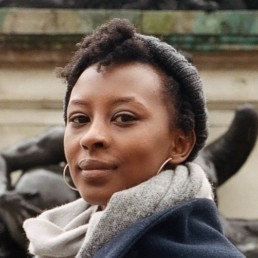By Jo Ingabire Moys
“As a genocide survivor, what do you think about ongoing persecution in Myanmar or the rise of anti-immigrant feeling in the West?”
I had just given a talk to an assembly of secondary school students when a history teacher asked me that question. Taken aback, I muttered, ‘I don’t know.’
Instantly the tension in the room dissolved. The students, who had clung to every word in my story of dodging bullets across hilltops and sleeping in ditches to hide from bloodthirsty militia. Now they began checking their phones, others chatting and giggling with their friends.
The disappointment on the teacher’s face was all too apparent. It seemed that I had missed my cue for a teaching moment on current affairs and the students, having listened to my testimony, had filed it under ‘just another history lesson’ and now the present beckoned.
Frankly, this seemed a reasonable approach to looking at genocide, especially to me as a survivor. I told my best friend from university that I had been in Rwanda in 1994 on the last day of our three-year degree. At first he thought it was a terrible joke, then horror, pity and curiosity washed across his face at once. He didn’t know if or what he could ask.
That kind of information changes a friendship. I had known this to be the case since I was 5. After my father and siblings were shot by local police officers whilst our neighbours watched from their windows, my mother knew that we if we were to survive we had to move. And so,we moved to hide from anyone who knew us because our names were on a list; we couldn’t be known as victims.
Occasionally the gunshot wounds in our limbs would betray us and we would move again. That’s how we lived throughout the 100 days of the genocide against the Tutsis.
I had mastered this lesson by the time I was a teenager living in London. The posturing was almost always about identity. I pretended to be Burundian when the movie Hotel Rwanda came out to avoid those curious glances and probing questions – questionsI didn’t what to contemplate let alone answer.
And yet, still, they followed me. In the age of Brexit, #MeToo, Libyan slave markets, natural disasters, the Refugee crisis, travel bans, ISIS, the Yazidi genocide and Rohingya ethnic cleansing it is difficult to determine which headline should bother you the most. I chose to disconnect, like many. Compassion fatigue is especially weighty when you can relate to the suffering of the people featured in morally questionable ‘charity porn’ adverts.
I admit that I have been burying my head in the sand and hoping that the promise ‘Never Again’, made to Holocaust and genocide survivors would be fulfilled.
I live in a peaceful nation where I experience little to no discrimination, so, to a large degree I have lived to see the fruit of that promise. What I didn’t consider was that although I had outgrown my fear of being identified as a victim, I wasn’t immune to an oppressor’s mind-set. It begins with apathy, a ‘them and us’ perspective, and subtle collaboration.
Divisive language and campaign promises soon become propaganda;minorities and immigrants become scapegoats for unstable economies. Slowly it makes sense, we believe it, we are seduced.The only cure to this an alternative voice.
There will always be people who wilfully chose hatred but for the undecided or uninformed a counter-cultural narrative is needed.
The international community or governments aren’t renowned for being on the right side of history as was the case in Rwanda, Sudan, and Syria and now in Myanmar.
There is hope, however in the average man’s kindness. The #LoveAmy Campaign raised a million dollars in a day to help the Rohingya people. Comic Relief’s 2017 funding raising campaign has broken records by raising over £75m. Hundreds of people welcomed Syrian refugees in their own homes because it was the decent thing to do.
Education in all sectors is a vital voice, uninfected by media hysteria, fake news and sensation headlines. A grassroots movement called the iDebate in Rwanda set up by student, Jean-Michel Habineza, allowed debaters to air and confront their parents’ prejudices. Children of survivors freely talked to children of perpetrators, forming their own opinions untarnished by decades of offences and conflict.
Standing on that education platform publically sharing a story that opposes genocide revisionist theory, I saw the students captivated by the truth.
It humanises, connects, teaches but also empowers. It demonstrates that we can choose to affect change positively even if in small measures.
The task of challenging extremist ideology is for all humankind because it ultimately affects us all, but it begins with personal responsibility. There are no glib answers to the big issues affecting society, but we can and must all take part in bringing solutions, however small.
Listening out for different voices, learning about shared values, and valuing our human rights and other people’s is one way we can honour the memory of victims of genocide and promise future generations, ‘Never Again’.
Jo Ingabire is a Film and TV professional based in London, survivor of 1994 genocide against the Tutsi and co-founder of Survivors Tribune a global educational initiative established by survivors of the 1994 Genocide against the Tutsi in Rwanda, drawing on their own first-hand experiences to make a stand against discrimination and genocide denial, promote reconciliation and forgiveness. ST enables survivors of modern genocides and other global conflicts to share their experiences through public speaking events in schools, colleges, and universities.

